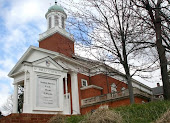December is such an interesting month, bringing along with it a time of preparation, colder weather, and most recently lots of rain - cold rain, even a moon halo last night. The other day I rean across a poem by U.Va. professor and poet Charles Wright, which comes from the book Zone Journals and intimately engages the month of December. The poem itself is a long poem entitled "A Journal of English Days."
(December)
- Noon like cicada wings,
translucence remembered, half-sheets
Of light over light on the black stones
Of the crescent walk and bodices of the rhododendron,
Red eye of the whirring sun -
December comes out of the ground
Shedding its skin on the bare trees,
And hovers above the northern sky
Wings like new glass,
wings like a thousand miles of new glass -
How sweet to think that Nature is solvency,
that something empirically true
Lies just under the dead leaves
That will make us anchorites in the dark
Chambers of some celestial perptuity -
nice to think that,
Given the bleak alternative,
Though it hasn't proved so before,
and won't now
No matter what things we scrape aside -
God is an abstract noun.
The poem continues after this line, but it is at this point that I would like to stop, as I think it embodies much of what the transition into December is like and much of what we feel during this time.
While the thought of God being abstract, something intangible may be discomforting to humans, actually should give us encouragement; that a loving presence exists everywhere; that because of its abstract nature, it is limitless. Linguistically, what Charles does is quite impressive. In the course of one sentence, the concept of love, while limitless, is also anchored, as a noun is something which we can both define, but not physically touch. Sure a noun is a person, place, thing, or idea, but can we physically touch a noun. We can touch the person; we can touch the place and the thing. But what we cannot do is physically touch the idea of a noun. In the same way, we feel a loving presence touching us, but this is often times something which we cannot physically touch. In reading this poem and in thinking about the concept of God, the concept of love, it then is wonderful to know that "...something empirically true / Lies just under the dead leaves...".
From the time we were children we have been told to "Love our neighbors as ourselves." Admittedly there are times when I cannot bring myself to love someone and there are times when I think love is completely absent from whatever situation or surroundings in which I find myself. During these times, however, it appears that God - that love, that this abstraction, this idea - is present whenever it enters our minds. That is to say that whenever we the idea comes into our heads, then love is present, "No matter what things we scrape aside.", and really, that one of our vocations in life is to love and allow ourselves to be loved.
